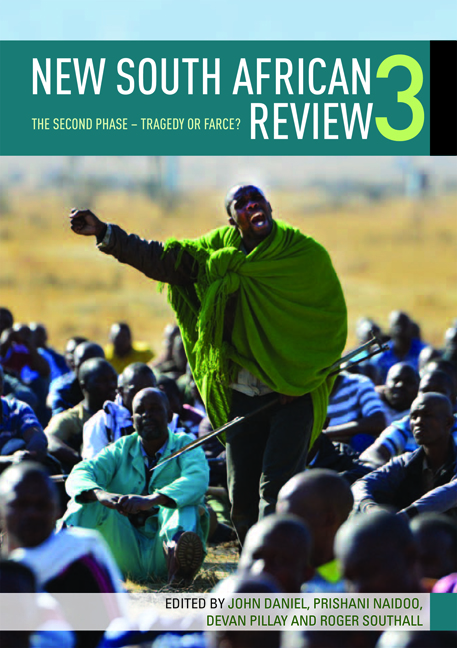Book contents
- Frontmatter
- Contents
- Preface
- Introduction: The second phase – tragedy or farce?
- PART 1 Party, Power and Class
- PART 2 Ecology, Economy and Labour
- Introduction: Ecology, economy and labour
- Chapter 5 Mass unemployment and the low-wage regime in South Africa
- Chapter 6 Nationalisation and the mines
- Chapter 7 Broad-based BEE? HCI's empowerment model and the syndicalist tradition
- Chapter 8 ‘Ask for a camel when you expect to get a goat’: Contentious politics and the climate justice movement
- Chapter 9 Hydraulic fracturing in South Africa: Correcting the democratic deficits
- PART THREE Public Policy and Social Practice
- PART 4 South Africa at Large
- Contributors
- Index
Chapter 6 - Nationalisation and the mines
from PART 2 - Ecology, Economy and Labour
Published online by Cambridge University Press: 31 May 2019
- Frontmatter
- Contents
- Preface
- Introduction: The second phase – tragedy or farce?
- PART 1 Party, Power and Class
- PART 2 Ecology, Economy and Labour
- Introduction: Ecology, economy and labour
- Chapter 5 Mass unemployment and the low-wage regime in South Africa
- Chapter 6 Nationalisation and the mines
- Chapter 7 Broad-based BEE? HCI's empowerment model and the syndicalist tradition
- Chapter 8 ‘Ask for a camel when you expect to get a goat’: Contentious politics and the climate justice movement
- Chapter 9 Hydraulic fracturing in South Africa: Correcting the democratic deficits
- PART THREE Public Policy and Social Practice
- PART 4 South Africa at Large
- Contributors
- Index
Summary
The arguments against nationalisation are overwhelming. But just because a policy direction is bad does not mean it will not be adopted and pursued.
In recent Cape Town history we have the example of the World Cup stadium being built, at crippling expense and in completely the wrong place, at the insistence of both ANC and Democratic Alliance (DA) politicians. This is a minor example, compared with the Great Leap Forward, the most disastrous policy choice in human history (Dikötter 2010), made by the leaders of the Communist Party of China. The Great Leap Forward came after the lessons of the ‘Little Leap Forward’ were ignored and before the Cultural Revolution, which even senior party leaders today acknowledge as a huge mistake.
‘Nationalisation’, whatever that means, is a policy favoured by a majority (or at least a plurality) of South Africans according to opinion polls (TNS Research Surveys 2011). Majority opinion in South Africa probably also favours a return to the death penalty, corporal punishment in schools, a ban on abortion and the abrogation of gay rights. We rely on the Constitution to protect us from the tyranny of public opinion in these areas. Any aggressive policy of nationalisation will face constitutional challenge at an early stage, but it can do a lot of damage before things reach that point. The expulsion of the leader of the Youth League from the ANC in 2012 appeared to some commentators to mark the end of the road for mine nationalisation. Other analysts had previously branded the call for nationalisation as the ‘rallying call for a factionalist power play’ that had little to do with mining or with the interests of mineworkers (Cronin 2012b). But no popular slogan is ever jettisoned only because it makes no sense.
The ANC tried to manage the stoked-up debate on nationalisation by appointing a research team to report broadly on state intervention in the mining industry. This included international case studies and options for South Africa to consider. In November 2011, after over a year of work, the report was discussed by the ANC's national executive. It was sent back for a rewrite before being released. The researchers were told to ‘write us a report that will be read by a member of the ANC, not a professor’ (Business Day, 29 November 2011).
- Type
- Chapter
- Information
- New South African Review 3The second phase - Tragedy or Farce?, pp. 119 - 137Publisher: Wits University PressPrint publication year: 2013



